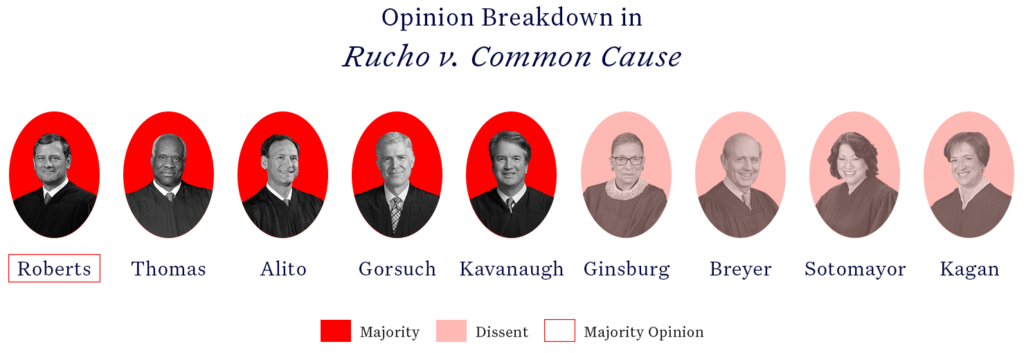North Carolina Partisan Gerrymandering (SCOTUS)
Rucho v. Common Cause
Lawsuit in which the U.S. Supreme Court ruled that partisan gerrymandering claims are nonjusticiable (meaning they are unsuitable for federal courts to decide) because they are “political questions beyond the reach of the federal courts.” The decision originated from a lawsuit in which North Carolina voters and organizations challenged the state’s congressional map for being partisan gerrymander that unfairly favored Republicans in violation of the U.S. Constitution. After the plaintiffs initially won at the district court level before a three-judge panel, the case was paused while the U.S. Supreme Court decided Gill v. Whitford, which dealt with individual voters’ ability to sue (in legal lingo, this is known as standing) over statewide redistricting maps and raise partisan gerrymandering claims. After the Court issued its opinion in Gill finding that the voters did not have the legal right to challenge the statewide map at issue, the North Carolina case was remanded back to the district court.
Following remand, the district court again ruled in favor of the plaintiffs and struck down North Carolina’s congressional map for being a partisan gerrymander. The Supreme Court agreed to hear the case on its full merits docket after the lower court’s decision was appealed. On June 27, 2019, the Court issued a joint ruling in both this case and Lamone v. Benisek, a case out of Maryland that raised similar partisan gerrymandering claims. In a 5-4 decision authored by Chief Justice John Roberts, the Court’s conservative justices held that federal courts could not rule on partisan gerrymandering claims, noting that the U.S. Constitution “assign[ed] the issue to the state legislatures, expressly checked and balanced by the Federal Congress” and therefore [f]ederal judges have no license to reallocate political power between the two major political parties.” This opinion meant that states courts, legislatures and Congress were left with the task of managing partisan gerrymandering (the ability to bring lawsuits raising partisan gerrymandering claims in state court was undisturbed by this opinion).

Case Documents (U.s. supreme court)
Case Documents (district court)
Last updated: